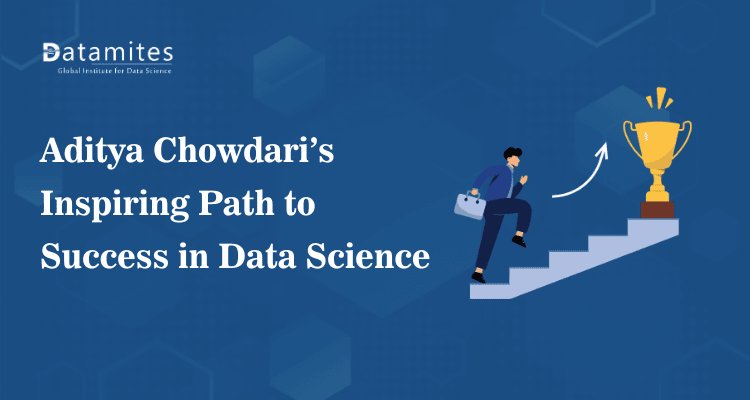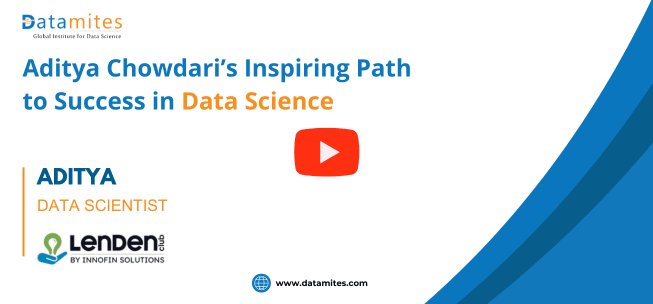Aditya Chowdari’s Inspiring Path to Success in Data Science
Aditya Chowdari’s journey highlights his determination and strategic learning approach to break into the data science field. His success story serves as motivation for aspiring data scientists aiming to build a rewarding career.

Data science is one of the hottest career paths today, but for many beginners, the road to breaking into this field is full of challenges. From mastering programming languages to understanding complex machine learning concepts and facing tough interviews, the journey can be daunting. However, with the right guidance and mindset, success is achievable.
We bring you the story of Aditya Chowdari, a fresh graduate who transformed from a complete beginner into a confident data science professional. Through his experiences with DataMites, Aditya not only learned the essential skills but also gained practical project experience and cracked interviews despite initial setbacks. This blog dives into his learning journey, struggles, and triumphs, offering invaluable insights for aspiring data scientists.
Aditya’s Journey into Data Science: A Story of Transformation with DataMites
From an engineering graduate to a skilled data science professional, Aditya’s path highlights how structured learning and perseverance with DataMites led to his career breakthrough.
Q1: Please introduce yourself and share your background.
I completed my Bachelor of Technology in Electronics and Communication Engineering in 2023. During my graduation, I learned Python and had some experience with data structures, so coding wasn’t completely new to me. But I wanted to dive deeper, so I enrolled in the DataMites data science course to learn systematically. I completed the course as well as an internship there, which helped me a lot.
Q2: How was your initial experience with learning Python, statistics, and machine learning?
Since I had already learned Python during my engineering, it wasn’t very tough initially. However, machine learning was challenging because I had forgotten most of the mathematics I had learned earlier — like differentiation and linear algebra. So I had to relearn these concepts to understand machine learning algorithms properly.
At DataMites Institute, I found that we didn’t need deep math — just the necessary concepts to apply machine learning effectively. That was reassuring because many think heavy math is required, but the basics you learn in school and engineering are usually sufficient.
Q3: How important is mathematics for a data scientist?
I used to think math was very important, but after learning through DataMites, I realized you don’t need heavy math for basic data science roles. However, if you want to advance into AI and deep learning, you do need to understand more advanced math like calculus and matrix operations. For most machine learning projects, practical application matters more.
Q4: What about statistics? How was that learning experience?
Statistics was well taught by the instructors, especially Pranu Sir and SS Sir. They covered everything from basic statistics to hypothesis testing and the advanced concepts needed for machine learning. The teaching was very clear, which helped me gain confidence in applying statistical techniques.
Q5: How did your projects and internship help shape your learning?
Initially, I found projects difficult because everything was new. But after completing two projects, I got a better understanding of the process — from data collection and cleaning to model building. Kaggle was an invaluable resource; I learned preprocessing techniques like handling missing values and different coding approaches from many experienced practitioners.
Q6: What challenges did you face in interviews?
I attended three interviews. One was with a company based in Hyderabad where I was asked to write code, but I forgot sorting algorithms during the test and couldn’t clear it.
Another Bangalore-based company interviewed me for about an hour and 20 minutes with basic questions related to my projects and Python coding, like string manipulation. I answered all the questions but never got feedback.
After these setbacks, I realized I needed to improve my coding and problem-solving skills, so I started practicing Python problems on arrays and strings, moving from simple to medium level challenges.
Q7: How did you deal with interview failures?
Failing interviews was tough but I understood that it’s part of the journey. I worked hard on problem-solving, which is crucial for technical rounds. Failures are stepping stones — learning from them and improving is key to eventually landing a job.
Q8: What role did mentorship and structured learning play in your success?
Mentorship was critical. DataMites provided a structured curriculum and great support from instructors. Their clear explanations and real-world examples helped me grasp tough concepts. The classroom environment also allowed me to ask doubts and interact with peers, which accelerated my learning.
Q9: Any advice for beginners looking to break into data science?
Start with Python and basic statistics. Use platforms like Kaggle to practice real projects. Don’t shy away from math but don’t be scared either — learn just what’s needed. Practice coding daily to improve problem-solving skills because interviews test this heavily. Finally, be patient and persistent; it takes time and multiple attempts.
Q10: How did you prepare for your data scientist interview?
I practiced solving Python coding questions extensively from GPT prompts and coding platforms like GeeksforGeeks. This helped me solve two coding questions in just two minutes during the interview.
Q11: How long did it take you to get a job after your training?
I joined the September batch and started preparing for placements by the end of May, with placement team involvement from June. It took about a month or two after training to get job calls.
Q12: When does the placement team usually start contacting students?
The placement team typically contacts students around the sixth month of the course (the course is eight months), during the grooming phase before actual placements start.
Q13: What advice do you have for aspiring data scientists?
Focus on learning from multiple authors and resources. Practice coding consistently. Be hungry for knowledge and persistent in your learning journey because the job will eventually come as a result of your learning.
Q14: Did you apply to jobs independently, like on LinkedIn? Did it work?
Applying independently on LinkedIn often does not work well because many job postings are ghost jobs without responses. It's better to rely on placement teams and focus on skill development.
Q15: What coding platforms do you recommend for practicing data science-related programming questions?
GeeksforGeeks and HackerRank are good platforms for practicing Python coding questions relevant to data science. LeetCode is less important for data science roles.
Q16: Is coding knowledge important for data science interviews?
Yes, coding and problem-solving skills are very important for data science roles because they test your ability to solve problems, not just theoretical knowledge.
Q17: What kind of assignments did you do during your training/internship?
I worked on large datasets requiring preprocessing, clustering into categories, and supervised learning to predict categories, which involved handling complex, similar classes like gaming and entertainment.
Q18: How did you create your resume?
I used a template from a resume website and edited it according to my information. The placement team helped me fine-tune it for every job application to better match job descriptions.
Q19: Which concepts are most important for data science interviews?
Interviewers usually focus on basic machine learning concepts and questions related to your project rather than advanced topics. Programming questions test problem-solving skills.
Q20: How important is data science in today’s world?
Data science is very important because it helps make better decisions by supporting them with factual data and predictions, impacting various areas like business, personal decisions, and technology development.
Refer these articles:
- From UPSC Aspirant to Data Scientist: Kiran’s Journey to success
- Inspiring Data Science Journey of Yash Sahindrakar
- From Physics Graduate to Data Scientist: Gujuri's Inspiring Journey
Aditya Chowdari’s Data Science Success: Key Insights and Takeaways
Aditya Chowdari’s journey from a beginner to a confident data science professional offers valuable lessons and practical advice for aspiring data scientists.
- Aditya completed a Bachelor of Technology in Electronics and Communication Engineering in 2023 and had some prior Python and coding knowledge.
- He enrolled in DataMites’ data science course for structured learning and also completed an internship there.
- Initial challenges included relearning math concepts like differentiation and linear algebra needed for machine learning.
- Heavy math is not necessary for basic data science roles; foundational school-level math is usually enough.
- For advanced AI and deep learning, more advanced math knowledge is required.
- Statistics was well taught and essential for understanding machine learning techniques.
- Projects and internships provided practical experience, especially in data preprocessing and model building.
- Kaggle was an invaluable resource for learning real-world data science techniques.
- Aditya faced interview setbacks including forgetting sorting algorithms and not getting feedback from some companies.
- He improved his coding and problem-solving skills by practicing Python problems on arrays and strings.
- Interview failures were seen as learning opportunities and part of the journey.
- Mentorship and a structured curriculum at DataMites helped him grasp complex concepts effectively.
- Interaction with instructors and peers accelerated his learning process.
- Beginners are advised to start with Python and basic statistics, practice on real projects, and gradually build math skills.
- Placement teams usually contact students around the sixth month of the eight-month course during the grooming phase.
- Resume customization with the placement team helps improve job application success.
- Interview questions mostly focus on basic machine learning concepts and problem-solving rather than advanced topics.
- Data science is important for making data-driven decisions in business, technology, and daily life.
- Persistence, patience, and continuous learning are key to succeeding in the data science job market.
Refer these articles:
If you're considering a transition into the field of data science, there's no better time to get started than now. According to MarketsandMarkets, the global Data Science Platform Market was valued at $95.3 billion in 2021 and is projected to reach $322.9 billion by 2026, growing at a CAGR of 27.7%. This explosive growth is driven by the massive expansion of digital data across industries. To grow in this fast-evolving domain, choosing a training institute that offers practical exposure, real-time internships, and reliable placement assistance is crucial. Enrolling in a well-structured data science course in Pune, Bangalore, Hyderabad, Chennai, Mumbai, or Delhi can be the stepping stone toward a successful tech career.
DataMites Institute has established itself as a premier institute for training in Data Science, Artificial Intelligence, Machine Learning, Python Development, and Data Analytics. Recognized among India’s Top 20 AI Institutes by Analytics India Magazine (AIM)—alongside esteemed institutions like IITs and IIMs—DataMites delivers high-quality, industry-relevant education. With accreditations from IABAC and NASSCOM FutureSkills, the institute offers expert-led instruction, practical project experience, and strong placement support, empowering learners to successfully transition into careers in data science.
Offering both offline data science training in Pune, Bangalore, Hyderabad, Chennai, Ahmedabad, Coimbatore, and Mumbai, and flexible online learning options, DataMites caters to a wide range of learners. Whether you're a recent graduate, an experienced professional, or someone looking to switch careers, DataMites provides a structured and hands-on approach to mastering skills in Data Science, AI, and Machine Learning.
Aditya’s success story is proof that anyone with dedication and access to structured learning can build a rewarding career in data science. With consistent effort, real-world project exposure, and the right training partner, breaking into this in-demand field becomes a very achievable goal.

